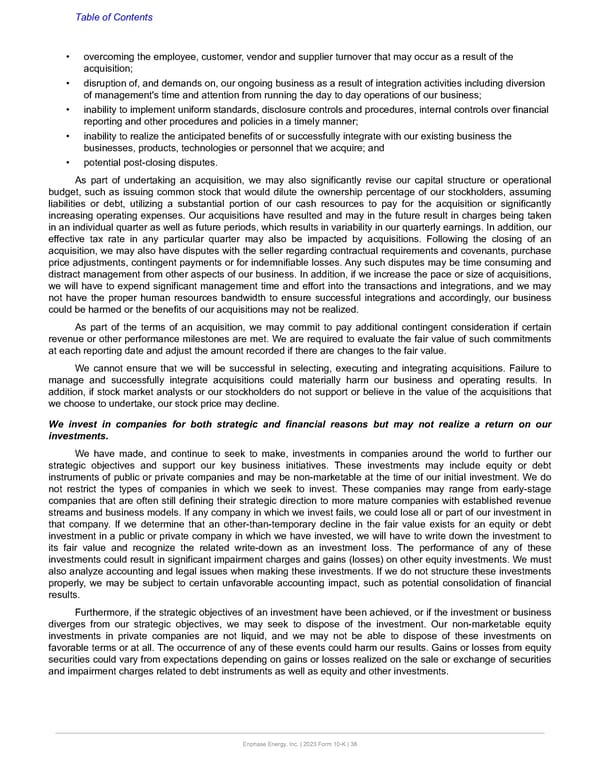Table of Contents • overcoming the employee, customer, vendor and supplier turnover that may occur as a result of the acquisition; • disruption of, and demands on, our ongoing business as a result of integration activities including diversion of management's time and attention from running the day to day operations of our business; • inability to implement uniform standards, disclosure controls and procedures, internal controls over financial reporting and other procedures and policies in a timely manner; • inability to realize the anticipated benefits of or successfully integrate with our existing business the businesses, products, technologies or personnel that we acquire; and • potential post-closing disputes. As part of undertaking an acquisition, we may also significantly revise our capital structure or operational budget, such as issuing common stock that would dilute the ownership percentage of our stockholders, assuming liabilities or debt, utilizing a substantial portion of our cash resources to pay for the acquisition or significantly increasing operating expenses. Our acquisitions have resulted and may in the future result in charges being taken in an individual quarter as well as future periods, which results in variability in our quarterly earnings. In addition, our effective tax rate in any particular quarter may also be impacted by acquisitions. Following the closing of an acquisition, we may also have disputes with the seller regarding contractual requirements and covenants, purchase price adjustments, contingent payments or for indemnifiable losses. Any such disputes may be time consuming and distract management from other aspects of our business. In addition, if we increase the pace or size of acquisitions, we will have to expend significant management time and effort into the transactions and integrations, and we may not have the proper human resources bandwidth to ensure successful integrations and accordingly, our business could be harmed or the benefits of our acquisitions may not be realized. As part of the terms of an acquisition, we may commit to pay additional contingent consideration if certain revenue or other performance milestones are met. We are required to evaluate the fair value of such commitments at each reporting date and adjust the amount recorded if there are changes to the fair value. We cannot ensure that we will be successful in selecting, executing and integrating acquisitions. Failure to manage and successfully integrate acquisitions could materially harm our business and operating results. In addition, if stock market analysts or our stockholders do not support or believe in the value of the acquisitions that we choose to undertake, our stock price may decline. We invest in companies for both strategic and financial reasons but may not realize a return on our investments. We have made, and continue to seek to make, investments in companies around the world to further our strategic objectives and support our key business initiatives. These investments may include equity or debt instruments of public or private companies and may be non-marketable at the time of our initial investment. We do not restrict the types of companies in which we seek to invest. These companies may range from early-stage companies that are often still defining their strategic direction to more mature companies with established revenue streams and business models. If any company in which we invest fails, we could lose all or part of our investment in that company. If we determine that an other-than-temporary decline in the fair value exists for an equity or debt investment in a public or private company in which we have invested, we will have to write down the investment to its fair value and recognize the related write-down as an investment loss. The performance of any of these investments could result in significant impairment charges and gains (losses) on other equity investments. We must also analyze accounting and legal issues when making these investments. If we do not structure these investments properly, we may be subject to certain unfavorable accounting impact, such as potential consolidation of financial results. Furthermore, if the strategic objectives of an investment have been achieved, or if the investment or business diverges from our strategic objectives, we may seek to dispose of the investment. Our non-marketable equity investments in private companies are not liquid, and we may not be able to dispose of these investments on favorable terms or at all. The occurrence of any of these events could harm our results. Gains or losses from equity securities could vary from expectations depending on gains or losses realized on the sale or exchange of securities and impairment charges related to debt instruments as well as equity and other investments. Enphase Energy, Inc. | 2023 Form 10-K | 38
 Annual Report Page 37 Page 39
Annual Report Page 37 Page 39